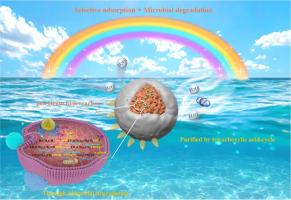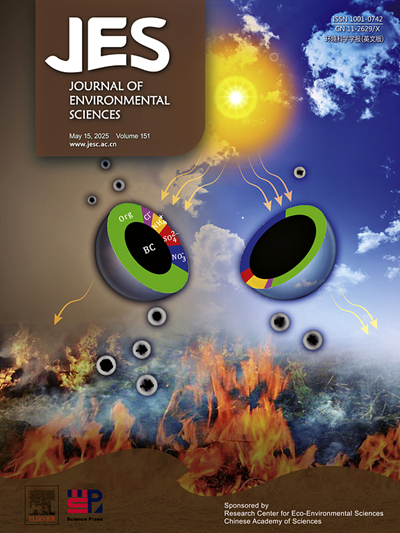咖啡渣衍生的核-壳气凝胶:在水中降解柴油污染物的制备和应用
IF 6.3
2区 环境科学与生态学
Q1 ENVIRONMENTAL SCIENCES
引用次数: 0
摘要
含油废水的有效和环境友好型管理,以及废物生物质的有益转化,对环境保护、公共卫生和可持续社会进步至关重要。本研究开发了一种具有选择性吸附和降解性能的新型生物质核壳生物反应器(CGC@SiO2气凝胶)。反应器的核心由咖啡纤维素气凝胶组成,提供有利于微生物定植的多孔框架,同时保护微生物免受不利的外部因素的影响。外壳集成了富含聚二甲基硅氧烷的疏水二氧化硅,这改变了材料的亲水性,使其能够在水中漂浮长达100天。这种超疏水层即使在连续十次摩擦后仍保持150°的接触角。实验结果表明,该材料具有良好的油水分离性能,连续9次成功实现了油水分离。在37°C, 120 r/min, pH = 7的条件下,对3wt .%柴油溶液的选择性吸附率为99%,去除率为91%,降解率为46.2%。此外,评估环境耐受性的测试显示,该材料在不同pH值和温度下具有强大的适应性和稳定性。与传统的疏水和亲脂材料或自由漂浮的微生物相比,CGC@SiO2气凝胶不仅能有效地捕获石油污染物,还能将其降解为无害物质。生物降解与选择性吸附相结合是处理含油废水的有效方法,具有重要的实际应用潜力。CGC@SiO2气凝胶的低碳生产符合循环经济原则,强调了其在可持续发展中的作用。本文章由计算机程序翻译,如有差异,请以英文原文为准。

Coffee grounds-derived core-shell aerogels: Preparation and application for diesel pollutant degradation in water
The effective and environmentally friendly management of oily wastewater, alongside the beneficial conversion of waste biomass, holds paramount importance for environmental conservation, public health, and sustainable societal progress. In this research, an innovative biomass core-shell bioreactor (CGC@SiO2 aerogel) with selective adsorption and degradation properties was developed. The reactor's core is composed of coffee cellulose aerogel, offering a porous framework conducive to microbial colonization while safeguarding microorganisms from adverse external factors. The shell integrates hydrophobic silica enriched with polydimethylsiloxane, which alters the material's hydrophilic properties, enabling it to remain afloat on water for up to 100 days. This superhydrophobic layer maintained a contact angle of 150° even after ten consecutive rubbings. Experimental results indicate that the material performs exceptionally well in oil-water separation, as demonstrated by its success in 9 consecutive oil-water separations. It achieved 99 % selective adsorption, 91 % removal, and 46.2 % degradation of a 3 wt.% diesel solution under conditions of 37 °C, 120 r/min, and pH = 7. Additionally, tests assessing environmental tolerance revealed the material's robust adaptability and stability across varying pH levels and temperatures. Compared to traditional hydrophobic and lipophilic materials or free-floating microorganisms, CGC@SiO2 aerogel not only efficiently captures oil pollutants but also degrades them into non-hazardous substances. Combining biodegradation with selective adsorption has shown to be an effective approach for treating oily wastewater, offering significant practical application potential. The low-carbon production of CGC@SiO2 aerogel aligns with circular economy principles, underscoring its role in sustainable development.
求助全文
通过发布文献求助,成功后即可免费获取论文全文。
去求助
来源期刊

Journal of Environmental Sciences-china
环境科学-环境科学
CiteScore
13.70
自引率
0.00%
发文量
6354
审稿时长
2.6 months
期刊介绍:
The Journal of Environmental Sciences is an international journal started in 1989. The journal is devoted to publish original, peer-reviewed research papers on main aspects of environmental sciences, such as environmental chemistry, environmental biology, ecology, geosciences and environmental physics. Appropriate subjects include basic and applied research on atmospheric, terrestrial and aquatic environments, pollution control and abatement technology, conservation of natural resources, environmental health and toxicology. Announcements of international environmental science meetings and other recent information are also included.
 求助内容:
求助内容: 应助结果提醒方式:
应助结果提醒方式:


